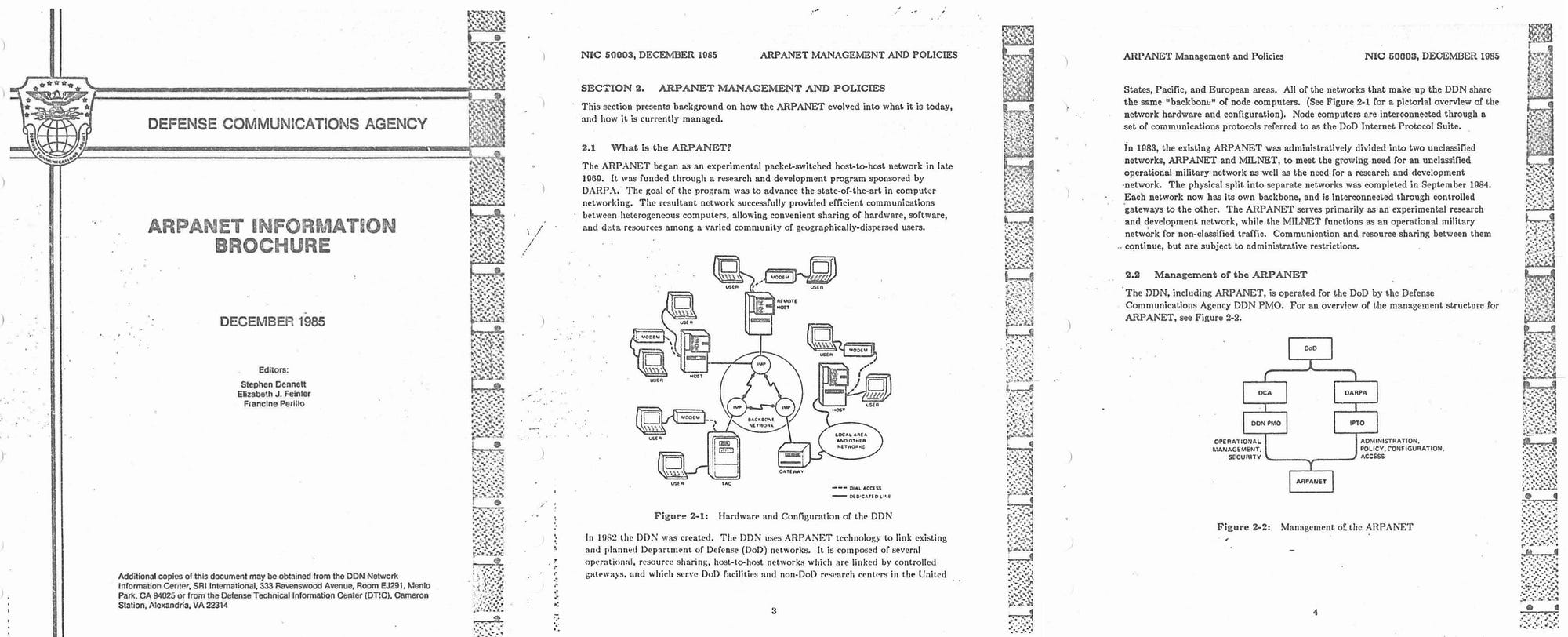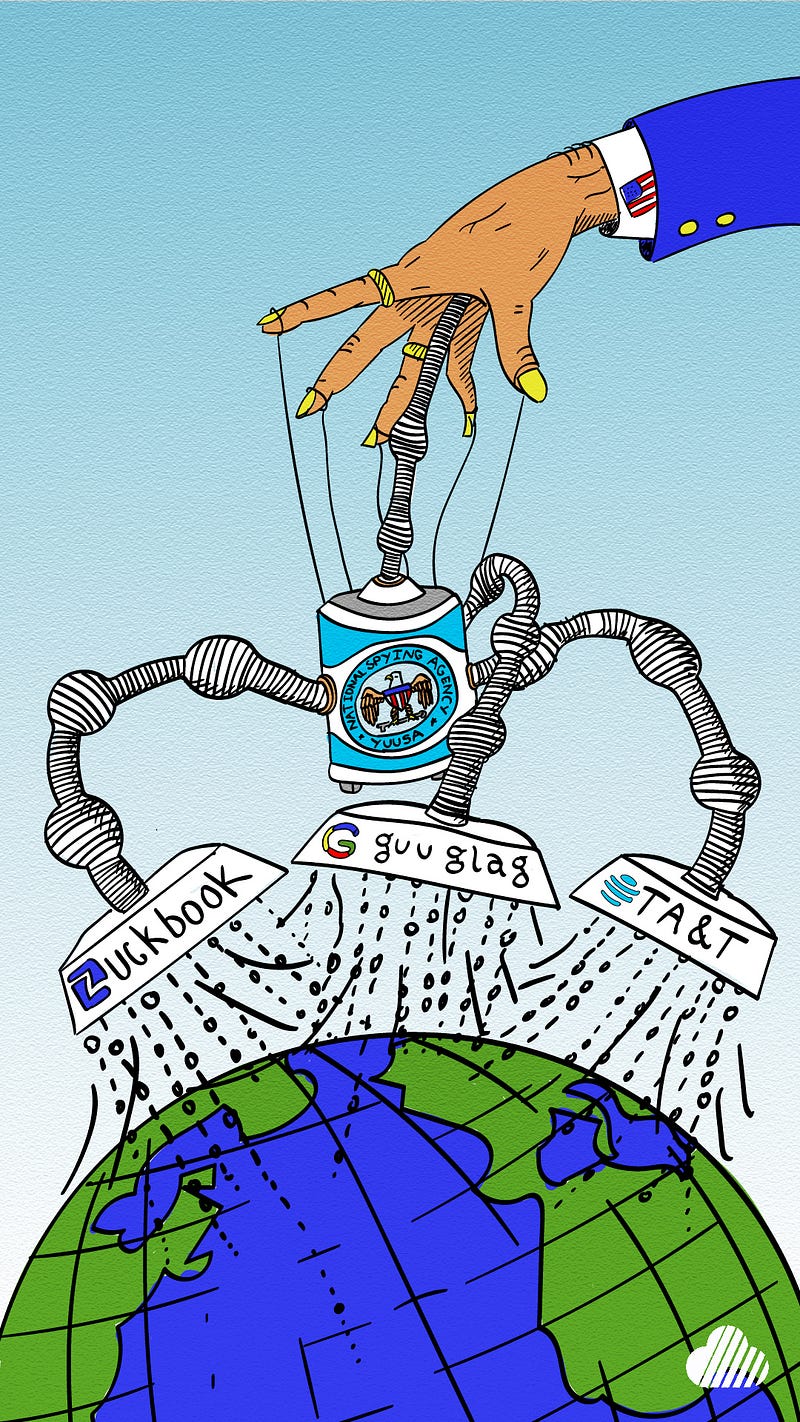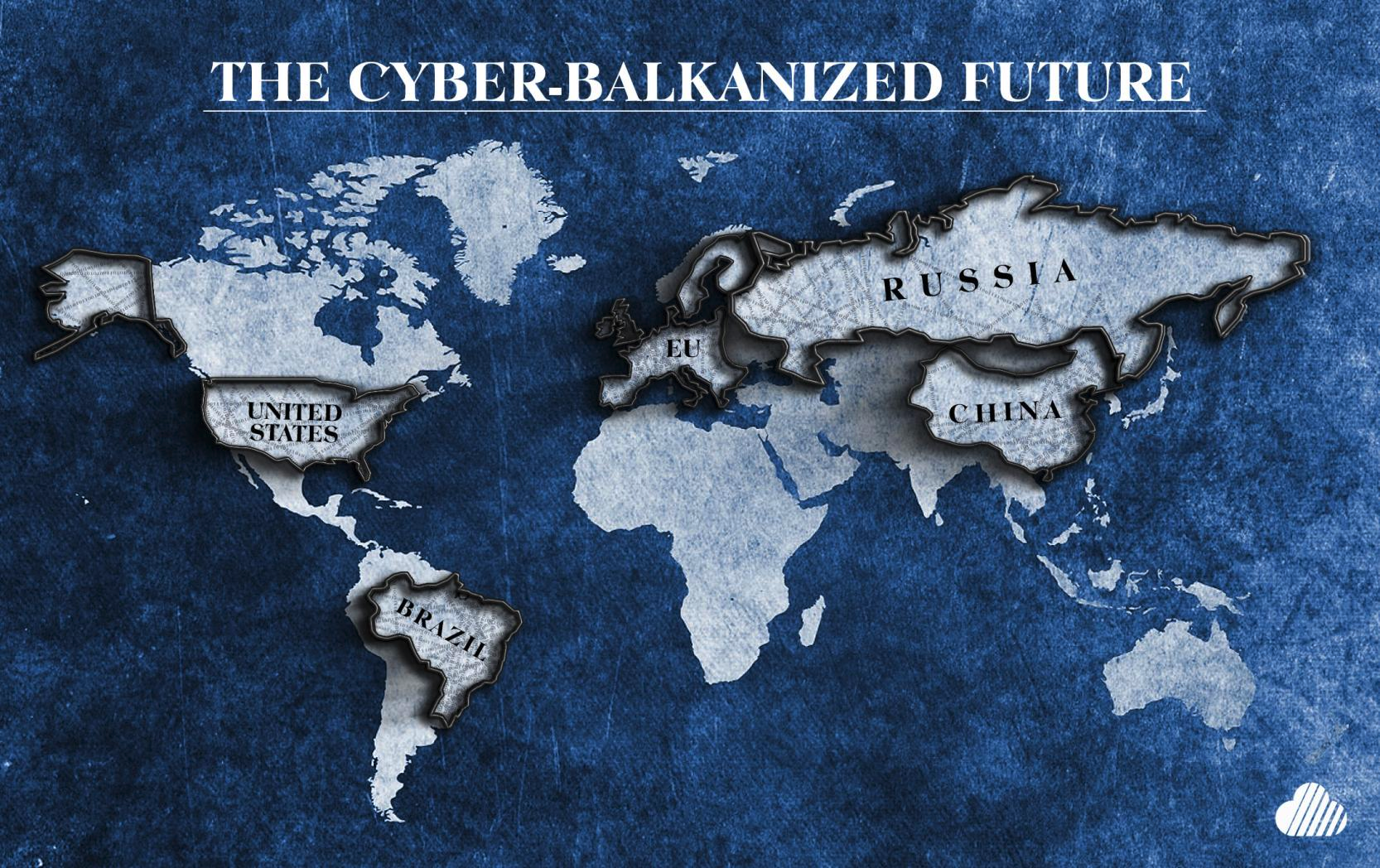“Balkanization” was first used to describe the fragmentation of the Balkan peninsula in Europe into a collection of smaller, mutually hostile countries drawn along religious and ethnic boundaries. Cyberbalkanization (also termed ‘internet balkanization’) describes the fragmentation of the global internet into a number of smaller, nationally-administered internets aligned along geopolitical boundaries. Today the internet is balkanizing into several distinct cyber-kingdoms lead by world superpowers China, Russia and Europe. This global trend reflects a scramble to defend informational sovereignty in an era of intrusive US internet surveillance and the rapidly emerging power of data.
Left unchecked, cyberbalkanization stands to radically reshape the online world with troubling implications for borderless information transmission, international collaboration and freedom of speech on a global scale. In this article, we examine the component causes, current state, and possible consequences of a globally balkanized internet.
Catalysts of fragmentation — the global internet is the US internet
The internet was conceived as a ‘network of networks’ linking geographically isolated communications intranets operating at strategic military locations. The precursor to the internet was the Advanced Research Projects Agency Network (ARPANET), built in the late 1960s by the US Department of Defense Advanced Research Projects Agency (ARPA, now known as DARPA). ARPANET was designed to meet the communication needs of the US military under the specter of the Cold War and nuclear threat. Until it was decommissioned in 1990, ARPANET served as an essential communication tool of the US military for two decades. As the first network to implement the TCP/IP protocol suite, ARPANET formed the technical foundation upon which the current internet is built. Ongoing advancements in networking technology by US companies and universities throughout the 1990s gave rise to a publicly-usable internet no longer under the explicit control of the US military. However, the internet’s links to the US government would never be totally expunged.
 ARPANET was the precursor to the internet, created and maintained by the United States Department of Defense Advanced Research Projects Agency as a highly-robust military communications network.
ARPANET was the precursor to the internet, created and maintained by the United States Department of Defense Advanced Research Projects Agency as a highly-robust military communications network.
Sitting at a geostrategic location between Asia, Europe, and Africa, the US became a relay point through which the majority of undersea fiber optic cables were laid. Thus the US became the telecommunications backbone of the world through which all internet traffic passed, and foreign nations connected to the internet through the United States in a hub-spoke model.
The creation of the World Wide Web catalyzed the growth of the internet by extending its function beyond mere communication and expanding its user base to the global public. The Web allowed people to access and share data across the internet through “websites” which hosted information stored on internet-connected servers. These were joined together by hypertext links, forming a global, freely-accessible information repository.
Over the next two decades, the Web became the tool by which billions of people access the internet. Instant communication, video streaming, online shopping and social networking revolutionized the way people interact and conduct business. The Web has enabled unprecedented efficiency and productivity gains for people, corporations, and governments around the world. However, the internet companies that spearheaded this technology revolution were overwhelmingly US-based, including Microsoft, Apple, eBay, Amazon, Yahoo, Google and then Facebook, AirBnB and Uber.
Despite its global reach and cosmopolitan contributor base, the internet and the Web remained firmly under US corporate auspices, and therefore US government control. This historical reality is the root cause of cyberbalkanization, detailed below.
Catalysts of fragmentation — (centralized) data is the new oil
The Web has been radically transformed since it was created in the early 1990s. Today, it no longer resembles the freely-accessible information commons that was envisioned by its creator Tim Berners-Lee. Instead, it has been transformed into an engine of corporate profit fuelled by the data and privacy breaches of users.
Web titans Google, Facebook, Twitter, Microsoft, Apple and Dropbox provide the world with near zero-marginal-cost services including file storage, instant messaging, photo sharing and video calling “free of charge”. By using these services, users consent to the storage and compilation of highly sensitive personal data including photos, emails, chat logs, files, browsing habits, search history, location information and purchasing decisions. This valuable trove of user data is compiled and analyzed using artificial intelligence to create highly accurate behavioral prediction models, exceeding the predictive ability of even intimate partners. These models are subsequently monetized by targeted advertising that shows users unique content based on their preferences.

This form of “surveillance capitalism” has proved highly lucrative and enormously successful. It has allowed the tech giants to create effective monopolies over social media, news, web search, email, instant messaging and other online services. Network effects have further allowed these platforms to accumulate user bases of multiple billions and dominate global website traffic.
As the new global media titans wielding unprecedented power over citizens’ information streams, Google and Facebook can readily manipulate users’ political opinions as easily as consumption preferences. This is achieved by promoting partisan voices, shadowbanning certain political perspectives or removing “undesirable” content. Mass social influence then becomes an issue of national security when used to manipulate the outcome of elections.
Recently, Google, Facebook and Twitter have collaborated with the US-aligned Mexican Electoral Institute to “combat fake news”, “inform the electorate” and “assist in the distribution of voting information” in the upcoming national elections. In practice, this entails US web companies filtering content in support of a specific candidate, reducing key political news to voters of specific demographics and promoting search results of the preferred candidate. There is no reason to believe similar tactics haven’t been used to manipulate non-cooperative regimes.
Historically, the US government has never been shy intervening in domestic politics of foreign nations, however this example illustrates the technological paradigm shift that has occurred. No longer do superpowers need to fund dissidents or revolutionaries to engineer regime change around the world. By manipulating Facebook, Twitter and Google they can hijack the democratic process using the power of online social influence which is unprecedented in the history of humanity.
“Undetectable mass social influence powered by artificial intelligence is an existential threat to humanity. The phenomena differs in traditional attempts to shape cultural and political phenomena by operating at scale, speed and increasingly at a subtlety that eclipses human capacities.”
Julian Assange
The power to influence foreign nations has been conferred on these companies by their own citizens. Users of Facebook, Google and Twitter make a Faustian bargain in which they are unwitting victims. Foreign user data is stored on US servers and ultimately remains under the control of US corporations where it can be exploited to project American hegemony across the world.
If the US has a “home field advantage” through control of internet traffic routing, so does it have an “away field” advantage by controlling the AI-powered data mining power of world’s most popular web service platforms. Centralization and weaponization of user data are fuelling cyberbalkanization. Nation states are scrambling to take the high ground in this battle and reclaim control of their citizens’ precious data.
Catalysts of fragmentation — Snowden and the US global surveillance apparatus
The path towards cyberbalkanization was cemented decisively in June 2013 when intelligence contractor Edward Snowden leaked a trove of classified documents from the US National Security Agency (NSA), revealing the existence of a global telecommunications surveillance apparatus of unprecedented scale and complexity. This act forever changed the course of internet history and served as the most significant catalyst for the creation of nationally-administered internets.
Snowden exposed spying programs including UPSTREAM and STELLARWIND. These programs involved government-mandated harvesting, storage and analysis of all foreign internet traffic crossing US borders. The US “home field advantage” was being exploited to its greatest extent in order eavesdrop on the communications of foreign nations.
The PRISM program allowed direct access to the servers of US web giants Google, Microsoft, Yahoo, Apple, Facebook and Dropbox, enabling warrantless, unrestricted access to user data. The PRISM revelations exposed the world’s most popular online services as corporate arms of the US surveillance state by their compliance with intelligence agencies.
The BLARNEY program exploited “commercial partnerships to gain access and exploit foreign intelligence obtained from global networks” and was used to spy on entities including the International Monetary Fund, the World Bank, the European Union, the United Nations, and at least 38 different countries, including US allies such as Italy, Japan, Brazil, France, Germany, Greece, Mexico, and Cyprus. Telecommunications titan AT&T was most strongly implicated in this program.
The XKeyscore program served as the Google-like search engine indexing and aggregating all the data collected across NSA programs. Edward Snowden described the power of this application:
“You could read anyone’s email in the world, anybody you’ve got an email address for. Any website: You can watch traffic to and from it. Any computer that an individual sits at: You can watch it. Any laptop that you’re tracking: you can follow it as it moves from place to place throughout the world. It’s a one-stop-shop for access to the NSA’s information.”
BULLRUN saw the NSA deliberately undermine online data and information security to facilitate surveillance; SKIDROWE harvested internet traffic passing between foreign satellites, and BOUNDLESSINFORMANT permitted wholesale collection of telephone metadata from foreign countries. Significantly, the Five Eyes surveillance consortium of Canada, New Zealand, Australia and the UK had access to, and contributed to these NSA surveillance programs. (Source: The Intercept)

These revelations confirmed what many suspected — that the US was exploiting its domination of the internet and Web to for geopolitical gain. All global internet and telecommunications data are intercepted, copied, stored, analysed by US intelligence agencies. Such surveillance was not restricted to specific individuals of interest or foreign enemies, rather it was dragnet surveillance encompassing US and foreign citizens alike. Effectively, anyone using the internet and its major web service platforms were un-consenting passengers on a mass surveillance juggernaut of the United States of America.
Snowden’s revelations laid bare the vulnerability of foreign nations to US espionage, which was occurring at multiple levels from the data transmission layer to the web service layer. From a US perspective, the NSA mass surveillance program is a logical utilization of its power as the gatekeeper of the modern internet. By maintaining supreme control over internet traffic flow and web service user data, the US gained enormous strategic advantages in its effort to maintains its status as the world superpower. Any nation wielding such power would be rationally expected to act in a similar manner. There is no reason to believe that US tech giants have stopped collaborating with the US intelligence agencies in data sharing and surveillance programs.
The rational case for cyber-secession
The component causes of cyberbalkanization effectively distill into a single necessary cause — the US control of the creation, storage and transmission of online data. What was previously a community-built highway is now a toll road operated by a single gatekeeper of overreaching influence and power.
Allies and rivals alike have begun efforts to break free from the US-controlled cyberspace in an effort to protect their informational sovereignty as an urgent matter of national security. A future of siloed, firewalled and incompatible internets is upon us and this rapid acceleration towards cyberbalkanization is being spearheaded by China, Russia and Europe.
Balkanization Now — The rise of the internet ‘walled gardens’
China
China maintains a completely independent internet ecosystem which is maintained by the dictate of the Chinese Communist Party. The Great Firewall of China defends Chinese cyber borders and facilitates censorship of citizens by blocking access to content undesirable to the Chinese government. Perhaps more importantly, the Great Firewall keeps the data of Chinese citizens, businesses and military beyond the reach of the US surveillance apparatus. Through government intervention, China has enforced strict regulations curtailing the ability of US web service companies to operate within its borders. Facebook remains banned in China, and Google never operated in the Chinese market after refusing to comply with mandated censorship laws. Apple currently operates in the Chinese market under the condition that all Apple servers are located in the country and maintained by government-affiliated companies.
Such restrictions on foreign operations have allowed China to bootstrap a vibrant domestic web service industry. Today, the entire Chinese population utilizes Chinese-controlled services including Baidu (the second largest search engine provider in the world), Tencent (a social media and e-commerce platform), Alibaba and JD (both e-commerce platforms). Whether or not this digital border protectionism was initiated by a continuation of communist ideology or a far-sighted strategic move in the 1990s, it has resulted in these four companies to be ranked in the top 10 of the largest internet companies in the world today while only serving Chinese users. Since China embraced a brand of top-down capitalism in the 1980s, differing cultural attitudes to surveillance and freedom of expression have allowed them to build a domestic surveillance apparatus of even greater scope than that of the US.
China stands as the only the nation to have successfully broken free from US internet and telecommunication dominance while demonstrating the potential for economic prosperity. It exists as the most fully formed cyberbalkanized nation.
Russia
In 2014, the Russian national security body commissioned the Russian Government to create an independent internet for the BRICS bloc (Brazil, Russia, India, China and South Africa) that would exist beyond the sphere of Western influence. Russian press secretary Dmitry Peskov stated,
“We all know who the chief administrator of the global internet is. And due to its volatility, we have to think about how to ensure our national security…It’s not about disconnecting Russia from the World Wide Web, it’s about protecting it (Russia) from possible external influence.”
Russia also enforced domestic data storage standards in 2015, forbidding Russian citizens data to leave the country. To this end, Russia appears to have completed work in an alternative Domain Name System (DNS) which would enable the Russian government to restrict access to foreign websites and web services like Facebook and Google. Similar to China, Russia has created a thriving domestic web industry. VKontakte is the most popular social media platform in Russia and Russian-speaking Kazakhstan, Belarus and Ukraine.
Europe
The trend towards cyberbalkanization is not only being observed among US rivals. The Snowden leaks revealed US spying on its Western allies, who are beginning to assert their informational sovereignty. Rather than create their own social media companies, Europe is gaining control of its citizens’ data by exerting soft power over US web service giants by means of legal action and fines. The infamous General Data Protection Regulation (GDPR) mandates the storage of EU citizens’ data to be stored on servers located within the EU borders. As the US threatens to redraw the global geopolitical border with anti-NATO rhetorics, the online world is beginning to mirror the political and national contours of the physical world.
The recent German legislation known locally as NetzDG perfectly illustrates the dual consequences of cyberbalkanization — foreign espionage protection and domestic censorship. This act allows Germany to fine internet giants like Facebook, Google and Twitter up to 50 million Euros for failing to remove illegal content from their platforms within 24 hours. As is expected of any absolute dictate, the definition of “illegal” is increasingly arbitrary and susceptible to slow but inevitable restrictions on freedom of speech.

The perils of a cyberbalkanized world
How might we imagine a cyberbalkanized future in which the global cyberspace commons becomes fragmented across national and geopolitical boundaries?
The major cyber blocs will continue to build domestic internet industries that route all traffic and store all user data internally. This will exacerbate a data siloing effect, restricting information flow across borders and rendering web services unusable from external geographic locations. Just as China has demonstrated, these efforts might be successful at preserving data sovereignty at the considerable cost of mass censorship.
Censorship of internet traffic will be achieved by centrally-administered firewalls that throttle and block access to foreign websites. The compliance of tech giants with national government agendas will facilitate this censorship by removing access to subversive materials, silencing dissidents and crushing free expression online. Western democracies will increasingly come to resemble authoritarian states in their effort to maintain control over their populations.
Cyberbalkanization will fundamentally be a triumph of the state over the individual right to free expression, free access to information, and freedom from intrusive surveillance.
Nations will pursue complete independence in networking and communication hardware by manufacturing devices like routers and cell phones domestically. New domestic telecommunications standards will be established that operate on internationally incompatible cellular and WiFi frequencies. All these measures will serve the dual purpose of facilitating friendly spy backdoors while defending against enemy spy backdoors. Cyberbalkanization of hardware and infrastructure will be driven by manufacturing titans such as Cisco and Huawei, which profit enormously from government-mandated contracts to produce devices that comply with these unique national standards.
Cyberbalkanization foreshadows the struggle for global supremacy between an incumbent US superpower and a rising China. The two superpowers remain the largest factions of the new cyberbalkanized world and they will recruit economic and cultural vassal states into their cyber-walled gardens.
China will attempt to continue its quest for economic world dominance by expanding its cyber-sphere of influence to encompass the nations of Africa and the beneficiaries of the One Road One Belt initiative. Russia will attempt to envelop all Russian-speaking nations and all nations of the former USSR. The Five Eyes intelligence collaborators UK, Australia, New Zealand and Canada will remain as anchoring nations in the fracturing US internet. All other nations unable to sustain their own independent internet ecosystems will likely remain under the sway of the US internet unless subsumed into the cyber-spheres of the major superpowers.
Cyberbalkanization will have devastating implications for businesses operating in multiple international jurisdictions that rely on seamless online connectivity. Incompatibility between web services, communication standards and hardware devices will dramatically increase the friction of coordinating multiple international offices.
Declining profitability of multinational corporations in response to this friction could have the knock-on effect of reducing global economic free trade in a time of inflamed trade isolationism. These multinational corporations and businesses will drive demand for solutions to the cyberbalkanization problem, compelled by shareholder interests and dwindling profits.
Just as the past two centuries were marked by wars for the control of oil, and so will the future be shaped by cyber-wars for the control of data. Cyberbalkanization is occurring simultaneously with equally divisive societal shifts including a worldwide retreat to nationalism, rapidly accelerating global economic inequality, political polarization in the West and the impending tsunami of industrial automation that stands to trigger mass unemployment of redundant, old-world occupations. Unimpeded cyberbalkanization has the potential to unwind the prosperity gains achieved in the decades since the creation of the internet and the Web, contributing to the emergence of conflict between nations unseen by the current generation.
Decentralization and the hope for a free future
Halting the global slide towards cyberbalkanization appears impossible owing to the fundamental incompatibility of free-information exchange with the agenda of the nation-state.
The solution to this fractured future is an entirely new internet transmission protocol and web service ecosystem. These platforms must be built from the ground-up to be neutral, stateless, decentralized and open-source. Only through decentralization can internet transmission and data storage be resistant to external manipulation and censorship inherent in 3rd-party ownership of user data. Replacing the US internet with a Chinese or European internet merely shifts the problem to a different geopolitical sphere of influence.
The new internet must be built on a foundation of peer-to-peer replicating data structures which obviate the need for centralized servers and its associated vulnerabilities. It must be able to achieve consensus on the state of these data structures between millions of nodes.
Traffic on this new internet must be encrypted to defeat attempts at throttling and surveillance yet fast enough to seamlessly replace the current internet protocols. Finally, the global digital citizens must be financially incentivized to build this new internet by providing and consuming bandwidth, storage and computation in a peer-to-peer marketplace.
These are but few of the features necessary to preserve open global communication in the face of inevitable cyberbalkanization that heralds nationalistic isolation, mistrust and eventually open conflict. The creation of a new internet is therefore an urgent and timely undertaking on which the hopes of the free world rest.
In the next article, we will examine how domestic corporate Internet Service Providers (ISPs) exploit monopoly powers to create an intensely potent catalyst for the creation of a new internet infrastructure.
No comments:
Post a Comment